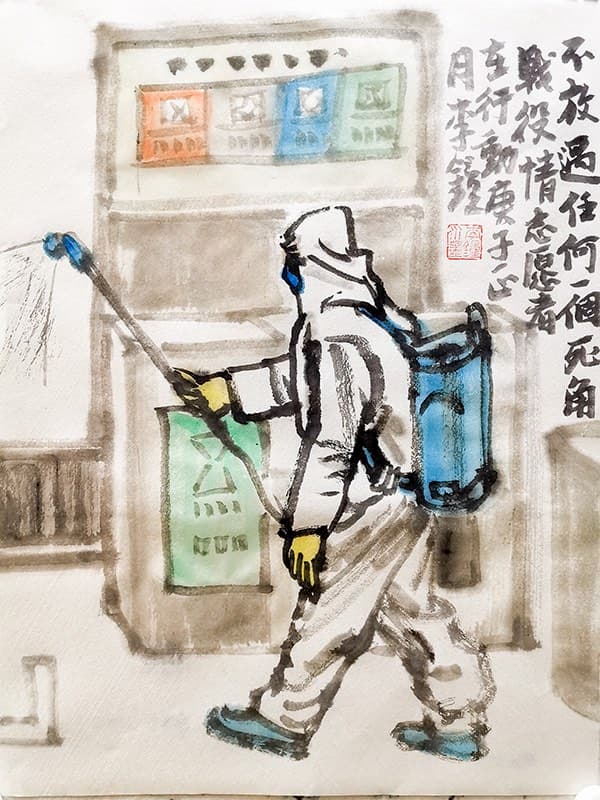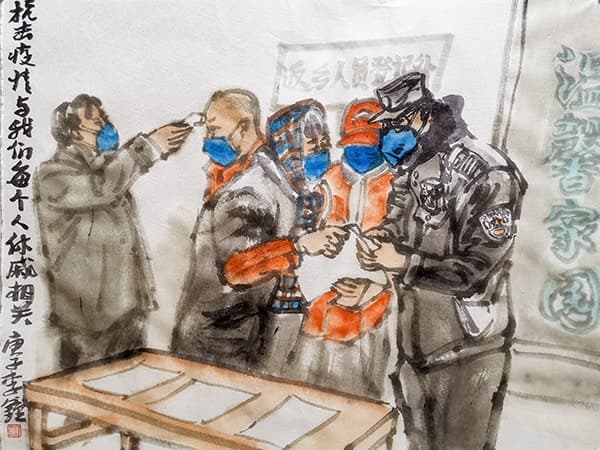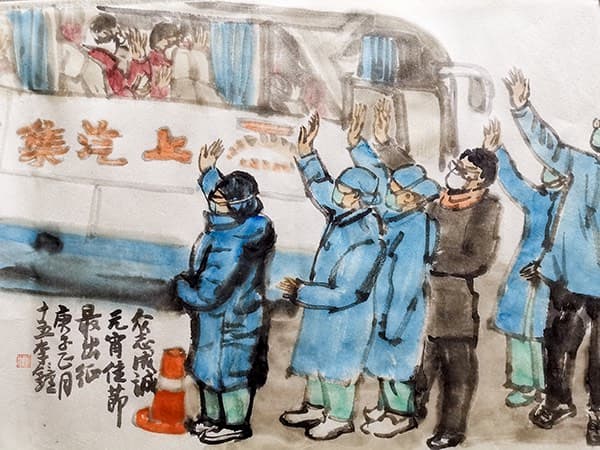When a global pandemic strikes, the private-sector austerity model simply falls apart, writes Vijay Prashad.

Li Zhong (China), Paintings for Wuhan, 2020.
By Vijay Prashad
Tricontinental: Institute for Social Research
 It is hard to remember that just a few weeks ago, the planet was in motion. There were protests in Delhi (India) and Quito (Ecuador), eruptions against the old order that ranged from anger at the economic policies of austerity and neoliberalism to frustration with the cultural policies of misogyny and racism. Ingeniously, in Santiago (Chile), during its wave after wave of protests, someone projected a powerful slogan onto the side of a building: “we won’t go back to normal, because normal was the problem.” Now, in the midst of the novel coronavirus, it seems impossible to imagine a return to the old world, the world that left us so helpless before the arrival of these deadly microscopic particles. Waves of anxiety prevail; death continues to stalk us. If there is a future, we say to each other, it cannot mimic the past.
It is hard to remember that just a few weeks ago, the planet was in motion. There were protests in Delhi (India) and Quito (Ecuador), eruptions against the old order that ranged from anger at the economic policies of austerity and neoliberalism to frustration with the cultural policies of misogyny and racism. Ingeniously, in Santiago (Chile), during its wave after wave of protests, someone projected a powerful slogan onto the side of a building: “we won’t go back to normal, because normal was the problem.” Now, in the midst of the novel coronavirus, it seems impossible to imagine a return to the old world, the world that left us so helpless before the arrival of these deadly microscopic particles. Waves of anxiety prevail; death continues to stalk us. If there is a future, we say to each other, it cannot mimic the past.
Certainly, the coronavirus is a serious matter and certainly its spread is a consequence of its own danger to the human body; but there are social issues here that bear serious thought. Key to any discussion has to be the sheer collapse of state institutions in most of the capitalist world, where these institutions have been privatized, and where private institutions have operated to minimize costs and maximize profit.

Li Zhong (China), Paintings for Wuhan, 2020.
This is most clear in the health sector, where public health institutions have been underfunded, where medical care has been transferred to private corporations, and where private hospitals and clinics operate without any surge capacity. This means that there are simply not enough hospital beds or medical equipment (masks, ventilators, etc.) and that the nurses, doctors, paramedics, janitors, and others on the front line are forced to operate in conditions of acute scarcity, in many cases without basic protection. It is often the people who make the least who are putting the most at stake to save lives in the face of the rapidly spreading pandemic. When a global pandemic strikes, the private-sector austerity model simply falls apart.

Li Zhong (China), Paintings for Wuhan, 2020.
Furthermore, our economic system has been so completely tilted to favor the financial sector and the plutocracy that it has – for a long time – simply ignored the growth of large-scale and permanent precarious employment, underemployment and unemployment. This is not a problem created by the coronavirus or by the collapse of oil prices; this is a structural problem for which a term – precariat, or precarious proletariat – was invented at least a decade ago. With lockdowns and social isolation, small businesses have shuttered, and precarious workers find that their precarity defines them entirely. Even the most hardened bourgeois politicians are now forced to confront the reality of two points:
- That workers exist. The State-imposed general strike to prevent the spread of the virus and its consequences have proved that it is workers who produce value in our society and not “entrepreneurs” who generate ideas, which they claim fancifully produces wealth. A world without workers is a world that halts.
- That the share of global wealth and income that workers control is now so low that they have limited reserves when their hard-earned incomes collapse. In the United States, one of the wealthiest countries in the world, a 2018 Federal Reserve study found that 40 percent of U.S. households do not have the means to deal with unexpected expenses of around $400. The situation is not much better in the European Union, where the Eurostat data shows that 32 percent of households cannot bear unexpected expenses. That is why in the capitalist States there is now openly talk of widespread income support – even a Universal Basic Income – to manage the collapse of livelihoods and to stimulate consumer demand.

Josef Lee (Singapore), Comics in Response to the Coronavirus, 2020.
Last week, the International Peoples Assembly and Tricontinental: Institute for Social Research released a 16-point programme for this complex moment. A concatenation of crises has struck us: there are the long-term structural crises of capitalism (decline in the rate of profit, low rates of investment in the productive sector, underemployment and precarious employment), and there are the short-term conjunctural crises (collapse of the price of oil, the coronavirus).
It is now widely recognized, even by the investment houses, that the strategy for recovery from the 2008-09 financial crisis is not going to work; pumping large amounts of cash into the banking sector will not help. Directed investments are necessary in areas that had previously faced serious austerity cuts – areas such as health care, including public health, and income support. Manuel Bertoldi of Frente Patria Grande (Argentina) and I make the case for a serious debate around these issues. More than a debate about each separate policy, we need a debate about the very nature of how to understand the state and its institutions.
A key achievement of austerity capitalism has been to delegitimize the idea of state institutions (notably those that improve the well-being of the population). In the West, the typical attitude has been to attack the government as an enemy of progress; to shrink government institutions – except the military – has been the goal. Any country with a robust government and State structure has been characterized as “authoritarian.”
But this crisis has shaken that certainty. Countries with intact state institutions that have been able to handle the pandemic – such as China – cannot be easily dismissed as authoritarian; a general understanding has come that these governments and their state institutions are instead efficient. Meanwhile, the states of the West that have been eaten into by austerity policies are now fumbling to deal with the crisis. The failure of the austerity health care system is now clearly visible. It is impossible to make the case any longer that privatization and austerity are more efficient than a system of State institutions that are made efficient over time by the process of trial and error.

Abduh Khalil (Egypt), Untitled, 1949.
The coronavirus has now crept into Palestine; most alarmingly, there is at least one case in Gaza, which is one of the world’s largest open-air prisons. The Palestinian Communist poet Samih al-Qasim (1939-2014) used to call his homeland the “great prison,” from whose isolation he gifted his luminous poetry. One of his poems, “Confession at Midday,” offers a brief journey into the emotional damage done to the world by austerity and neoliberalism:
I planted a tree
I scorned the fruit
I used its trunk as firewood
I made a lute
And played a tune
I smashed the lute
Lost the fruit
Lost the tune
I wept over the tree
The coronavirus has only just begun to make its impact on India, whose public health system has been deeply eroded by a generation of neoliberal economic policies. Within India, the state of Kerala (population 35 million) – governed by the Left Democratic Front – is in the midst of a campaign to tackle the coronavirus – as Subin Dennis, a researcher at the Tricontinental: Institute for Social Research, and I make clear in this report. Our findings suggest that Kerala has certain in-built advantages and that it has put in place measures that are worthy of study.
How is Kerala tackling the Coronavirus pandemic?
- Kerala’s left governments over the past several decades have fought to maintain and even extend the public health system.
- Kerala’s left parties and organizations have helped develop a culture of organization, solidarity and public action.
- Kerala’s left government was swift in enacting measures to trace those infected by the virus through “contact tracing” and testing at transportation hubs.
- The chief minister and health minister held daily press conferences that calmly provided the public with credible information and an analysis of the crisis and unfolding events.
- The slogan “Break the Chain” captures the attempt by the government and by society to enforce forms of physical isolation, quarantine, and treatment to prevent the spread of the virus.
- The slogan “Physical Distance, Social Unity” underlines the importance of raising resources to assist those in economic and psychological distress.
- Public action – led by trade unions, youth groups, women’s organizations, and cooperatives – of cleaning and preparing supplies has lifted the spirit of the people, encouraging them to trust in social unity and not to fragment into trauma.
- Finally, the government announced a relief package worth Rs. 20,000 crores, which includes loans to families through the women’s cooperative Kudumbashree; higher allocations for a rural employment guarantee scheme; two months of pension payments to the elderly; free food grains; and restaurants to provide food at subsidized rates. Utility payments for water and electricity as well as interest on debt payments will be suspended.
This is a rational and decent programme; it, along with the 16-point plan, should be studied and adopted elsewhere. To dither is to play with the lives of people.
Kate Janse van Rensburg (South Africa), Marco Rivadeneira, 2020.
Colombia has implemented a national 19-day quarantine. Meanwhile, in prisons in Colombia, inmates held a protest against overcrowding and bad health facilities, fearing the death count if coronavirus breaches the walls; the crackdown by the state led to the death of 23 people. This is a fear in prisons around the world.
Meanwhile on 19 March, Marco Rivadeneira, an important leader of the agricultural worker and peasant movement in Colombia, was in a meeting with peasants in the municipality of Puerto Asís. Three armed men burst into the meeting, seized Marco, and assassinated him. He is one of more than a hundred leaders of popular movements who has been assassinated this year in Colombia, and one of 800 murdered since 2016 when the civil war was suspended. As Tricontinental: Institute for Social Research dossier No. 23 (December 2019) shows, this violence is a direct consequence of the unwillingness of the oligarchy to allow history to advance. They want to return to a “normal” situation that benefits them. But Marco wanted to create a new world. He was killed for the hope that motivated him.
Vijay Prashad, an Indian historian, journalist and commentator, is the executive director of Tricontinental: Institute for Social Research and the chief editor of Left Word Books.
This article is from Tricontinental: Institute for Social Research.
The views expressed are solely those of the author and may or may not reflect those of Consortium News.
Please Donate to Consortium News.
Before commenting please read Robert Parry’s Comment Policy. Allegations unsupported by facts, gross or misleading factual errors and ad hominem attacks, and abusive or rude language toward other commenters or our writers will not be published. If your comment does not immediately appear, please be patient as it is manually reviewed. For security reasons, please refrain from inserting links in your comments, which should not be longer than 300 words.
.

As a socialist, who certainly appreciates the dangers and dishonesty of ‘austerity capitalism”, I feel that China was a bad example to cite. for ‘efficiency” and “robust government” .They are in fact an authoritarian state that punishes any deviation from the party line. It does not take a neo-liberal henchman to see that. Furthermore, China ,these days, is almost outdoing America in corporate capitalism as a giant like Alibaba attests to. And just how under control is the spread of the virus there? Yes, America is now leading the world in Covid 19 cases ,thanks to a self -serving dimwit in the White House working for his corporate cronies , but as today’s New York Times headline reads,” China Had a Fail-Safe Way to Track Contagions. officials failed to Use it” Would not Cuba or S. Korea have serves as better examples?
Other pathogens are being released from the thawing permafrost and glaciers where they have lain dormant for centuries. We ain’t seen nothin’ yet.
At last serious analysis and pertinent analogies. Lets hope this can lead to solutions to our inhumanity before it destroys those who make it possible by providing the labour and care. I trust these theses will be further developed and made more deep and detailed to relate to and solve the multiple problems of a world run on madness and shortsighted greed. Real hope and underlying solutions are what we need!
I’m sorry to say that we will probably go from normal to “hyper-normal.” In the rubble left behind by coronavirus, the strong will gobble up the weak. Private equity firms already have several trillion dollars of “dry powder” just waiting to be used to acquire assets at deeply depressed prices. Right wing authoritarianism is at least as likely to emerge as left wing nirvana. The end result could be greater concentration of wealth and power than we have ever experienced before. I hope to be proven wrong, but my innate pessimism is flashing red.
Completely agree. As referenced by Mr. Costa below, this is just part of an ever increasing “climate change” within society…
Yes, the private sector austerity model falls apart.
Yet the Democrats have adopted it too. It isn’t just the Republicans now.
We lack a political movement that does not adopt austerity, at exactly the moment when austerity is the problem and must be abandoned by all parties.
We are the proverbial frog in the slow boiling water. We’re in a state of siege and don’t even know it. We are in the glass cage of US imperialism. I think this will get much worse for those who wish for equity and social transformation. It won’t be the invisible virus that “kills” but the power struggle that is in process as we “hunker down”.
Now is the time to launch a mass struggle for what we really need…
Close the gaps… $2,000.00 a month for every adult and $100.00 a month for every child in the family… and a National Public Health Care System based on the model of public education. Argue about the rest later.
I’m sure we won’t return back to normal – much like we didn’t after 2001. The problem is that these evolutionary changes rarely go in the right direction – rather than doing the right things, we instead become increasingly oppressed in the name of all the right things.
I have great sympathy for this kind of analysis but it is missing something – the ecological crisis.
From a health point of view the degradation of the biosphere is particularly important because it disrupts ecological systems in a way that drives species together in new combinations that are less safe. For example closer proximity of bats to humans caused by plantations displacing tropical forests is implicated in both ebola and the coronavirus infection. Suburban development around cities is creating conditions ideal for mice and thus for the spread of ticks and Lyme disease. Agriculture has overused anti biotics and created anti-biotic resistant strains of diseases. There’s more…..
The way that I look at is that the global economy is hitting against the limits to economic growth. This was predicted in the early 1970s and the authors of the famous study “The Limits to Growth” identified two problems that would bring growth to a halt early in the 21st century: pollution (think climate change, ocean acidification, water pollution brought about by fracking etc ) and depletion of production inputs making it more expensive to extract energy, minerals, biomass….
Depletion is particularly important for its implications for the energy sector. It is a problem in addition to the greenhouse effect. It means that a higher percentage of the output of the energy sector has to be used to extract oil, gas and coal – or be diverted to constructing, installing and maintaining a new wind and solar system. As I wrote in another article late last year:
Instead of conceptualising the economy as labour and capital, we all need to adjust our thinking a little and think of a modern economy as consisting mostly of human guided machines, equipment, vehicles, appliances, structures and infrastructures – nearly all of which are powered and/or require energy to construct and maintain them. The productive power of a modern economy is because of the energy that flows through this system. Work has a meaning in physics as well as in economics, and the work that an averagely fit person can do with their muscles is about 3kWh a day – but the energy flowing through the machines of the European economy is over 100 times this per capita and over 200 times this per capita in the USA. However some of the energy must be devoted to the extraction, refining, delivery and the conversions of the energy system itself. When this proportion goes up from less than 2% to 8% then the energy delivered to the rest of the economy falls from 98% to 92%…..and counting.
This is the source of secular stagnation that some economists talk about. This is not a crisis the price system will sort out. The cost of extracting or generating energy rises but people cannot pay for the rising cost without cutting down on things – or getting into debt! But of course debt is a purely temporary solution and in the context of the coronavirus the debt mountain is a disaster. The energy sector is heading into a massive crisis.
So the virus is only the beginning. Yes, the debt crisis comes next but that then knocks on into a collapse of much of the production sector. We are in a contractionary process that is much greater than most people realise. Emergency measures can be taken rescue and bail out – but a lot of production and services are going to disappear and massive retraining will be needed.
It is possible for the monetary authorities to create money and to find ways to rescue and bail out – and their efforts should be focused on Main Street rather than Wall Street. A Basic Income would help and a Debt Jubilee as Michael Hudson has argued. This will help people start again with “a clean slate” which is tremendously important psychologically.
However, it is not possible for the monetary authorities to print oil or natural gas – or create it at a computer keyboard at the Fed. Policy to rescue the financial system and bail people out will only go so far if the energy system and the production system crumbles with disintegrating supply chains and, in the USA, collapsing oil supply from fracking shale. The implications of that are going to be very profound indeed.
Shale gas and shale oil are exhaustible resources. In the 1950s the most productive American natural gas field was located near Williamsport in central Pennsylvania. Within 15 years the easy-to-drill gas reservoirs were exhausted. Today’s modern drilling technology is an astounding technological achievement. However, the shale-gas resources will be depleted, just as the easy-gas resources were depleted sixty years ago. Conserving energy resources is necessary, and reducing the combustion of hydro-carbon resources will also reduce the delivery of CO2 into the atmosphere.
Nobody seems to have broken the code that goods and services that should be available to the public should be provided by the public (i.e. the government). Why? Because the focus of the agency providing the goods and services should be on providing said goods and services and not on making a profit or paying dividends or bonuses.
In the civilized world, maybe. In the US, where every crisis is an opportunity to double down on profits, the only change will be the acceleration of callous inhumanity.
Speaking of inhumanity – it’s ironic that some states recognize that shelter in place should preclude going out for walks / exercise / going to parks for the sake of “mental health” – yet psychiatric wards regularly deprive people of exactly these things, in the name of “mental health”.
Nothing rings true in this snake pit of a country…
Long live socialist democracy – killer capitalism is doing us in.
how many of us already knew this, and thank goodness it’s getting a bit of airtime now. Sanders is doing a better job in explaining that we are all ‘socialists’ now…. why does anyone thing anything will change? the pandemic will simply further concentrate money and resources into the control of a smaller group of people who will not share and have no sense of community with people who are not billionaires. how does anything change short of a real revolution when our tiny lives get miserable enough to face bullets rather than starvation. that’s what i see coming and the only way for any change at all. Knowing that history tells us that things almost never get better after such a populist revolt.
it is not an accident that america, founded by wealthy white men whose goal was to preserve and increase their own personal wealth, has an ethic of “rugged individualism.” That is, you’re on your own in this life and thinking you are part of a larger community is a sign of weakness and is disgusting. that is the spirit of capitalism–you’re on your own, money is more important that people, and if anything threatens those with money, then we will force those without to bail them out. How is this any different from medieval feudal systems?
Give any person- or government- enough power and you’ll realize who’s in control. It won’t be you unless you’re holding it or sharing it. Nobody had enough preparation for this- no any government system was “enough”. What’s the new normal from this? It may be to learn personal space, hand washing hygiene, the benefits of staying home and spending time with your family or at least outside of your job. Mother Theresa said something similar to.. “if you want to change the world, go home and love your family” … she was onto something..
It would be wrong to say that neo-liberal policies don’t work. They do, but only for a small fraction of the world’s population. This is not what we were promised early in the 1980s; moreover, it was argued that There Is No Alternative. But there is always an alternative when the stakes are high enough. It was the Japanese attack on Pearl Harbour which led the United States to implement a quasi-socialist war economy. As follows:
”The war economy did not stimulate the private sector, it replaced the free market and capitalist investment for profit. Consumption did not restore economic growth as Keynesians expected … instead it was investment led mainly in weapons of destruction.
In many industries corporate executives resisted converting to military production because they did not want to lose consumer market share to competitors who did not convert. Conversion thus became a goal pursued public officials and labour union leaders. Auto companies only fully converted to war production in 1942 and only began substantially contributing to aircraft production in 1943 … From the beginning of preparedness in 1939 to the peak of wartime production in 1944, the war economy could not be left to the capitalist system to deliver. To organize the war economy and ensure that it produced the goods needed for war, the federal government created an array of mobilization agencies which often produced goods, closely directed those goods manufacture, and heavily influenced the operation of private companies and whole industries.
The military services were largely able to curtail production destined for civilians – e.g., automobiles and non-essential foods – and even for war-related but non-military purposes – e.g., textiles and clothing. The Department of the Treasury introduced the first general income tax in US history, and war bonds were sold to the public. Beginning in 1940 the government extended income tax to all citizens and collected it by deductions from wages at source. Those subject to income tax rose from 4 million in 1939 to 43 million by 1945.
With such a large pool of taxpayers the US government took $45 billion in 1945, an enormous increase over the $8.7 billion in 1941 … Over the same period federal tax take grew from about 8% of GDP to more than 20%. All told taxes provided about $136.8 billion of the wars total cost of $304 billion. To cover the other $167.2 billion, the Treasury expanded its bond programme which served as a valuable source of revenue for the government. By the time Bond sales ended in 1946, 85 millions of Americans had purchased some £185 billion worth of securities often through automatic deductions from their paychecks. ”
(The Long Depression – Michael Roberts – p.57)
Now tell me that socialism (albeit war socialism) would never work in the US. It could, and it did. Where is our FDR when you need him!?
It should also be added that economic systems is always subordinate to the political forces who determine the choice of economic policy. There is always an alternative.
A formula 1 car is tuned to be very efficient. Any bit of metal which can be shaved off to save weight, and any non essential bolt or screw, is removed… because the vehicle has one job. It is specialized to be a racing car. If all goes well, the thing will be so fast and so good at it’s task, nothing else will do.
Austerity, entailed in neoliberal capitalism, as a socioeconomic system, is the same.
If the task is to funnel wealth to the rich, so that they may grow, thus perpetuating capitalism, then austerity makes sense.
If the task of a socioeconomic model is to be resilient, in time of crisis, like driving over an unforeseen bump in the road, then austerity capitalism poops its pants, then dies in a high speed fireball.
Instead of accepting this, that some inefficiencies are there to provide safety and health to the people, the charred corpse of neoliberal capitalism demands trillions be printed to duct-tape the stupid car back together again, and do more of the same stuff which cannot handle a bump in the road.
Great, we still don’t have a car which can pick up the kids from school, or drive to the hospital safely.
Stupid car. We put fences around real racetracks to stop wreckage flying off and hurting observers. Wall st lobbying took them down, and self-regulation happened, and made our collective fates cling to the rear spoiler of a race car, when the drivers cannot even see the next bend, or bump in the road far enough ahead to avoid high speed disintegration.
I used to think post 2008, that capitalism had failed, and was playing it’s “third half” (it was), now I really hope we stop the “fourth”. This cycle has to stop.
Great analogy.
The cycle will only stop when all the race cars simultaneously crash into the grandstands and erupt into a huge fireball.